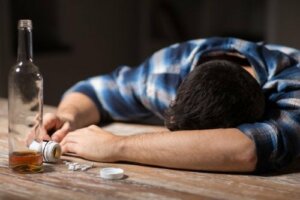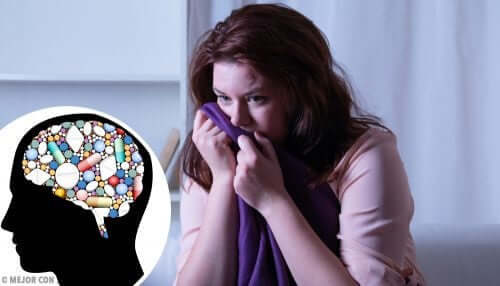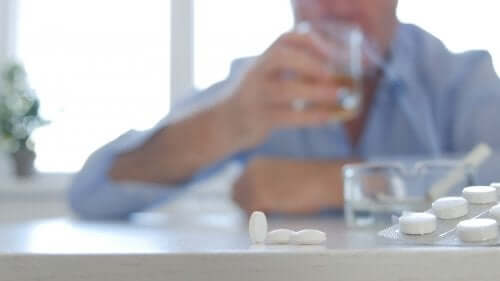Antidepressants and Alcohol: What Effects Does Combining Them Have?

Many people combine antidepressants and alcohol without knowing that this combination of substances can have serious health consequences.
In addition, 15% of the people who suffer from an affective-type disorder have an alcohol dependency, which makes the situation worse.
What are antidepressants?

In the body, we have substances called neurotransmitters that are responsible for transmitting signals. One of them–serotonin–regulates mood and its deficiency leads to depression. However, it’s not the only neurotransmitter involved in this disease.
Thus, antidepressants aim to increase the concentration of these neurotransmitters in the body and thereby reverse this pathological mood.
There are different types of antidepressants such as the following:
- Selective serotonin reuptake inhibitors (SSRIs)
- Serotonin and Norepinephrine Reuptake Inhibitors (SNRIs)
- Atypical antidepressants
- Tricyclic antidepressants
- Monoamine oxidase inhibitors (MAOIs)
What effects do they produce?
Despite having a different mechanism, all antidepressants have the same objective. Among the side effects that they can produce in the body we can highlight the following:
- Fatigue and drowsiness
- Nausea
- Insomnia
- Dryness in the mouth
- Blurred vision
- Constipation
- Agitation, restlessness, and anxiety
Read also: How to Overcome Depression Due to Infidelity
The danger of taking antidepressants and alcohol

For example, selective serotonin reuptake inhibitors, as we’ve seen, increase the concentration of this neurotransmitter, preventing its reuptake. Alcohol, at the same time, also increases serotonin levels, although in a temporary way.
In this way, a person who takes antidepressants and alcohol is at risk of having too much serotonin in the brain and, as a result, they may develop serotonin syndrome.
What is serotonin syndrome?
As we’ve mentioned, serotonin syndrome is a clinical condition that results from an excess of serotonin. However, its severity is very variable and depends on the cause.
Patients with this syndrome experience restlessness, agitation, high blood pressure, muscular spasms, and diarrhea. What’s more, in the most severe cases, the patient’s life may be in danger.
On the other hand, if alcohol consumption is chronic and prolonged, it can lead to low levels of serotonin. Why? Because our body adapts to psychoactive substances through a phenomenon known as habituation.
Thus, when getting used to the intake of alcohol, depressive symptoms appear because the available serotonin decreases. And if, in addition, the person takes antidepressants, the result will be a decrease in their effectiveness.
The effects of combining antidepressants and alcohol

- Worsening of the depressive state: Unfortunately, drinking alcohol can counteract the beneficial effects of antidepressants generating greater difficulty in the treatment of symptoms.
- Decreased cognitive activity: As we all know, alcohol affects coordination, thinking, and reaction times. Therefore, if both substances are combined, the effects of antidepressants on the central nervous system will aggravate these effects.
- Sedative effects: Some antidepressants can produce drowsiness, and this effect is also characteristic of alcohol. Therefore, when a person takes both substances together, the sedative effect may become more intense. You should practice special caution when you’re going to drive, for example.
- Risk of death: This is obviously the most serious consequence that the combination of antidepressants and alcohol would have. As we explained above, it’s produced by a serious case of serotonin syndrome.
Conclusions
As you can see, the combined use of antidepressants and alcohol can have serious consequences. Therefore, before beginning treatment with this type of medication, it’s very important that you discuss your alcohol consumption with your doctor, especially if you have any type of pathology with this substance. Otherwise, the consequences may be fatal.
All cited sources were thoroughly reviewed by our team to ensure their quality, reliability, currency, and validity. The bibliography of this article was considered reliable and of academic or scientific accuracy.
- Travé Rodríguez, A. L., & Reneses Sacristán, A. (2002). Manejo de los fármacos en el tratamiento de la depresión. Información Terapéutica Del Sistema Nacional de Salud.
- Heerlein, A. (2002). Tratamientos farmacológicos antidepresivos. Revista Chilena de Neuro-Psiquiatria.
- Robledo, T., & Córdoba, R. (2007). Cómo Actuar Ante El Consumo De Alcohol: Guía ded Referencia para Profesionales de Atención Primaria. Sociedad Española de Medicina Familiar y Comunitaria (SemFYC).
This text is provided for informational purposes only and does not replace consultation with a professional. If in doubt, consult your specialist.








